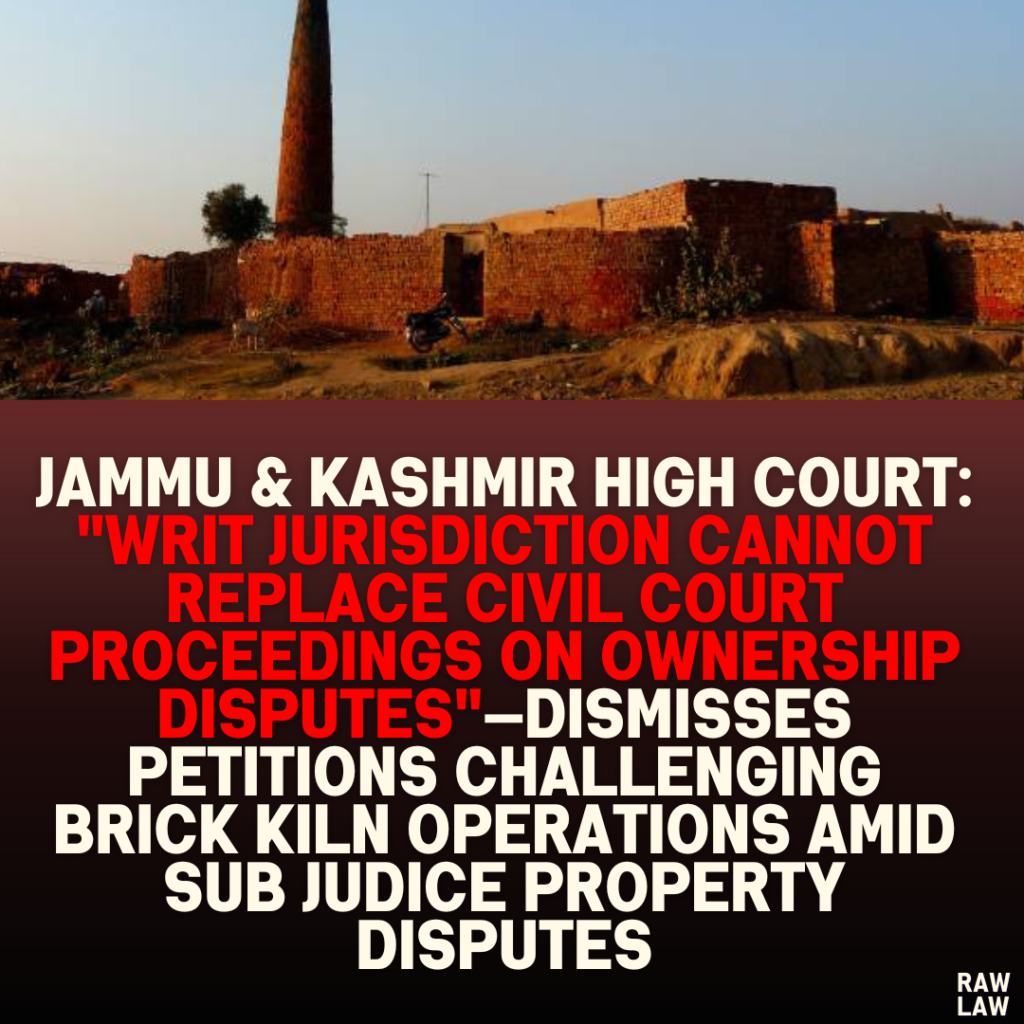Court’s Decision
The High Court dismissed the writ petitions, finding them misconceived. It held that the petitioner improperly used writ jurisdiction to settle a property dispute already sub judice before the civil court. The Court stated, “This Court does not find any reason to show indulgence,” particularly when a civil suit is pending concerning the validity of the sale deed.
Facts
- The petitioner contested the legality of a brick kiln established on a land parcel alleged to differ from the licensed survey number.
- Originally, land measuring 4 Kanals (Survey No. 326 min) was sold to Sanjay Kumar, who established a brick kiln under a license issued in 2003.
- During subsequent demarcation, it was revealed that the kiln was on Survey No. 421, owned by respondent No. 6, who had purchased it in 2010.
- The petitioner claimed the brick kiln endangered adjacent lands and violated the Jammu and Kashmir Brick Kiln (Regulation) Act, 2010.
Issues
- Was the brick kiln established on land authorized by the license?
- Did the appellate authority (respondent No. 2) have jurisdiction to set aside the earlier sealing order?
- Could the petitioner use writ jurisdiction to challenge a matter sub judice before the civil court?
Petitioner’s Arguments
- The brick kiln was improperly established on Survey No. 421 instead of 326 min, violating Section 10 and Section 21 of the Brick Kiln Regulation Act.
- The appellate authority overstepped its jurisdiction by entertaining the appeal and reversing the order to seal the kiln.
- The respondent’s actions deprived the petitioner of lawful ownership of the land.
Respondent’s Arguments
- Respondent No. 6 argued that any error in survey numbers was the result of mistakes by revenue authorities, not a deliberate act.
- The land where the kiln was found was later purchased by respondent No. 6, and the mining plan was duly approved by the Director, Geology and Mining.
- The petitioner had no objections from 2003 to 2016 and was now using writ proceedings to disrupt settled property matters.
Analysis of the Law
- Jurisdiction: The appellate authority acted within its jurisdiction under the J&K Brick Kiln (Regulation) Act, 2010, and directed corrections to the revenue records.
- Land Use Compliance: Survey No. 421, recorded as “Gair Mumkin Khad,” did not violate Section 4 of the Act, which prohibits brick kilns on agricultural lands.
- Role of Writ Jurisdiction: Writ remedies are not meant to replace civil court proceedings on ownership disputes.
Precedent Analysis
No significant precedents were directly applied. The court relied on statutory interpretation and procedural correctness to resolve jurisdictional issues.
Court’s Reasoning
The Court emphasized that the writ petition attempted to resolve private disputes under the guise of public interest. It stated, “This Court says so because the petitioner has specifically raised the plea that by virtue of the impugned order, he has been denied/deprived of his land.” The Court noted that the petitioner’s claims were already before the City Judge, Jammu, regarding ownership disputes, and interference at this stage was unwarranted.
Conclusion
The petitions were dismissed as misconceived, with the Court refraining from commenting on the sub judice property disputes. Contempt proceedings tied to the writ petition were also closed.
Implications
- The judgment reinforces the limited scope of writ jurisdiction in resolving private property disputes already under civil litigation.
- It highlights the importance of precise land demarcation and licensing processes in compliance with regulatory laws.
- Authorities must exercise jurisdiction strictly as per statutory provisions, ensuring procedural compliance while addressing disputes.



